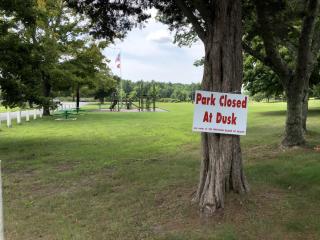West Nile Virus Concerns in Massachusetts - Freetown's Public Parks Closed Dusk to Dawn

September 7, 2018: DPH Announces 10th Human Case of West Nile Virus in Massachusetts
The most recent case is a man in his 60s from Essex County who was hospitalized during his illness. The risk for additional cases of WNV is being raised to high in Lynn, Malden, Melrose, Revere, Saugus and Winthrop.
September 4, 2018: Four more human cases in MA announced by State Officials
State Officials announce four more human cases in Massachusetts, including one man in Bristol County. At the Board of Selectmen's meeting on September 4th, Health Agent Derek Macedo urges residents to take care in preventing exposure to mosquitos.
August 28, 2018: State health officials announce fourth case of West Nile virus in Massachusetts
A woman from Middlesex County in her 50s, who was never hospitalized for her illness, has been diagnosed with West Nile Virus. She is the fourth human case in Massachusetts in 2018.
August 25, 2018: Board of Health Closes All Public Parks from Dusk through Dawn
In an abundance of caution, Board of Health Agent Derek Macedo has announced that all public parks are to be closed from dusk through dawn, due to the state-wide elevated threat of the West Nile Virus. Signs have been posted at Hathaway Park in Assonet and the Central Park ballfields in East Freetown, but this closure goes for all public parks in Freetown.
August 24, 2018: First Three Human Cases of 2018 Confirmed
The Massachusetts Department of Public Health has confirmed the first three human cases of 2018, with the patients located in Worcester, Suffolk and Middlesex counties. A horse in Hampshire County has also been infected. While not local, these cases show that you must be careful and proactive in preventing mosquito exposure this time of year.
August 21, 2018: The Massachusetts Department of Public Health (MDPH) announced today that West Nile virus (WNV) has been detected in 3 mosquitoes collected from Freetown, Massachusetts.
WNV is most commonly transmitted to humans by the bite of an infected mosquito. The mosquitoes that carry this virus are common throughout the state, and are found in urban as well as more rural areas. While WNV can infect people of all ages, people over the age of 50 are at higher risk for severe infection.
By taking a few, common-sense precautions, people can help to protect themselves and their loved ones:
Avoid Mosquito Bites
- Be Aware of Peak Mosquito Hours - The hours from dusk to dawn are peak biting times for many mosquitoes. Consider rescheduling outdoor activities that occur during evening or early morning. If you are outdoors at any time and notice mosquitoes around you, take steps to avoid being bitten by moving indoors, covering up and/or wearing repellant.
- Clothing Can Help reduce mosquito bites. Although it may be difficult to do when it’s hot, wearing long-sleeves, long pants and socks when outdoors will help keep mosquitoes away from your skin.
- Apply Insect Repellent when you go outdoors. Use a repellent with DEET (N, N-diethyl-m-toluamide), permethrin, picaridin (KBR 3023), IR3535 or oil of lemon eucalyptus [p-methane 3, 8-diol (PMD)] according to the instructions on the product label. DEET products should not be used on infants under two months of age and should be used in concentrations of 30% or less on older children. Oil of lemon eucalyptus should not be used on children under three years of age. Permethrin products are intended for use on items such as clothing, shoes, bed nets and camping gear and should not be applied to skin.
Mosquito-Proof Your Home
- Drain Standing Water – Many mosquitoes lay their eggs in standing water. Limit the number of places around your home for mosquitoes to breed by either draining or getting rid of items that hold water. Check rain gutters and drains. Empty any unused flowerpots and wading pools, and change water in birdbaths frequently.~
- Install or Repair Screens - Some mosquitoes like to come indoors. Keep them outside by having tightly-fitting screens on all of your windows and doors.
For More Information...
MA DPH's Surveillance data, listing communities where positive results were obtained: http://www.mosquitoresults.com/
Mass.gov's Mosquito-borne illness section: https://www.mass.gov/mosquito-borne-diseases
A little more information from mass.gov on protection from mosquitos: https://www.mass.gov/service-details/mosquitoes-and-ticks-theyre-out-in-mass

